Media
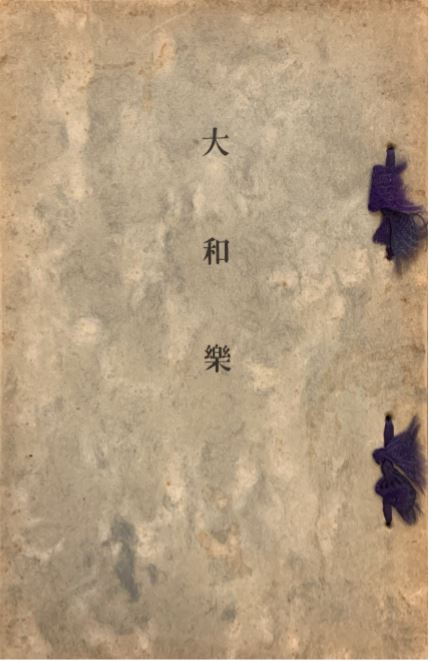
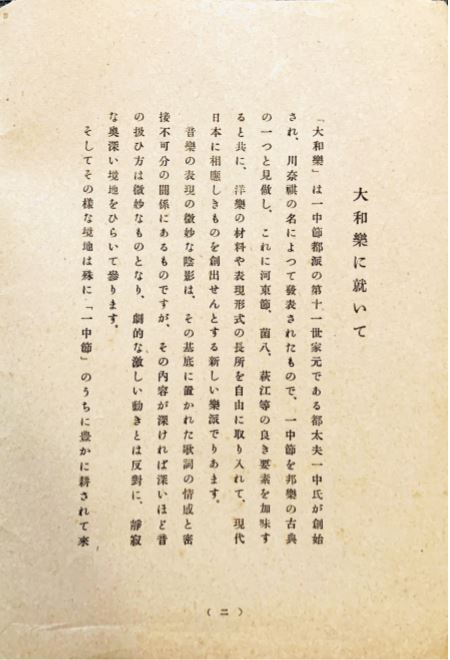
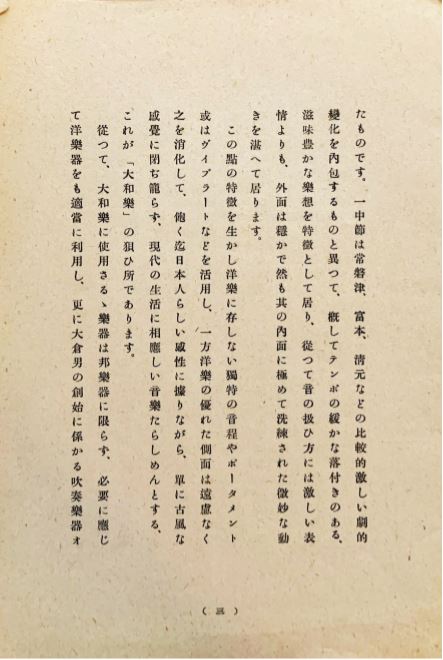
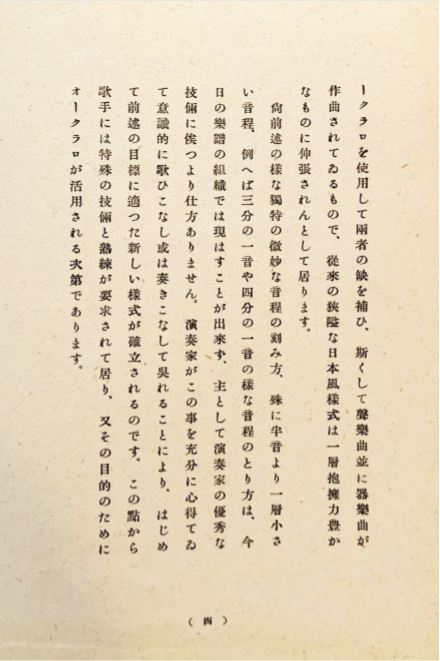
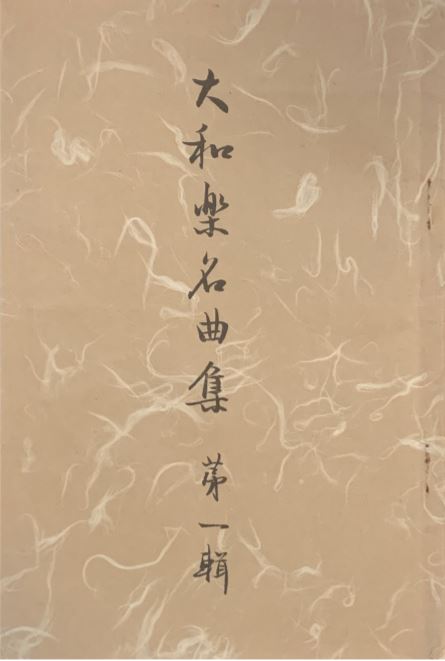

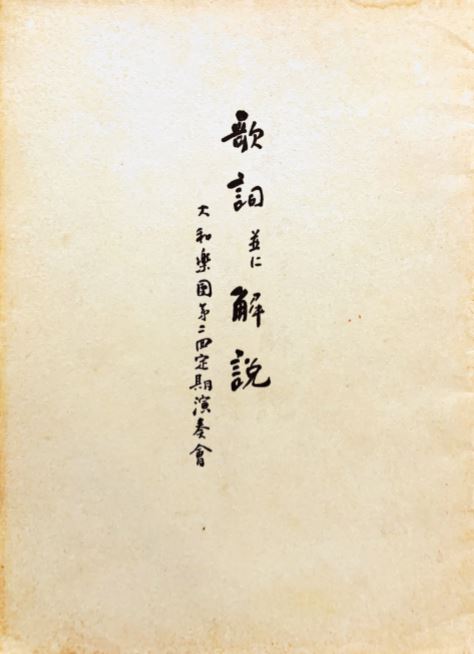
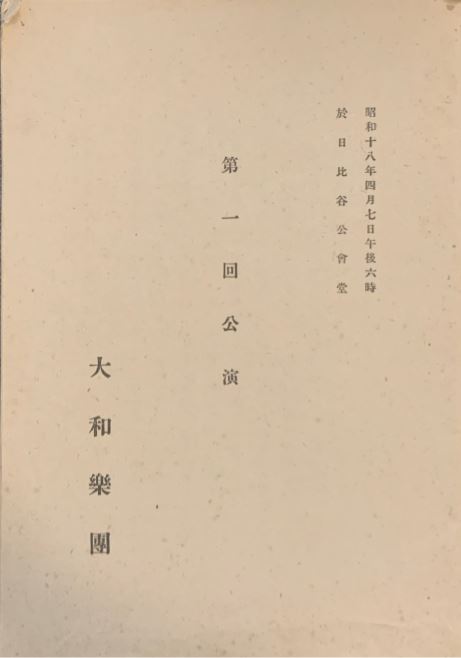
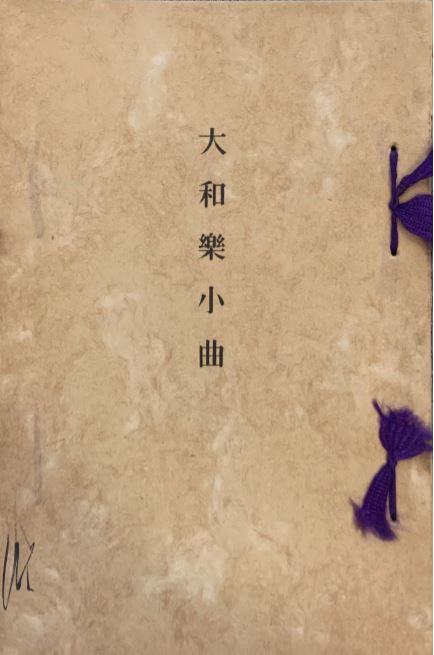
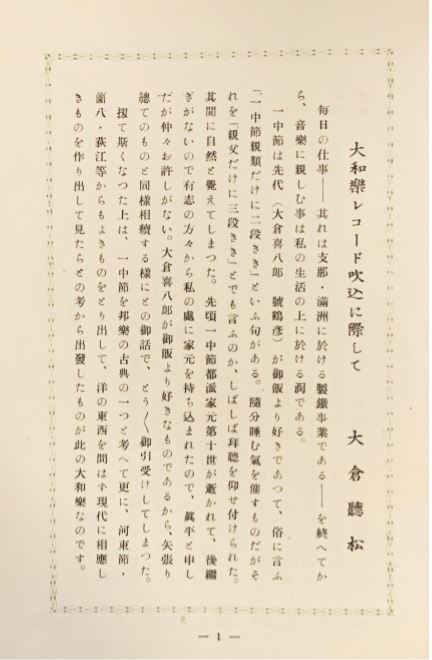
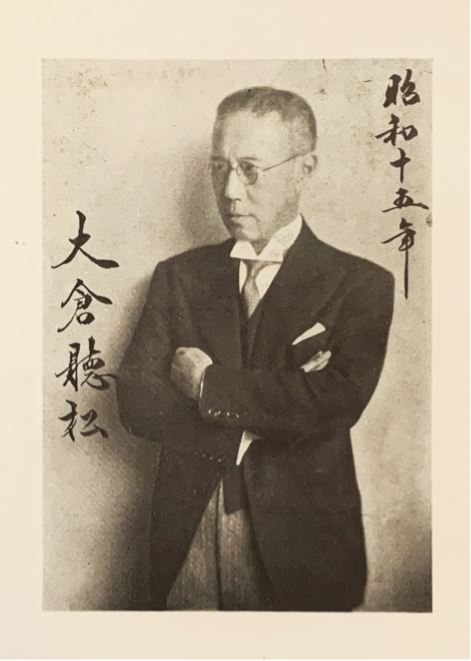
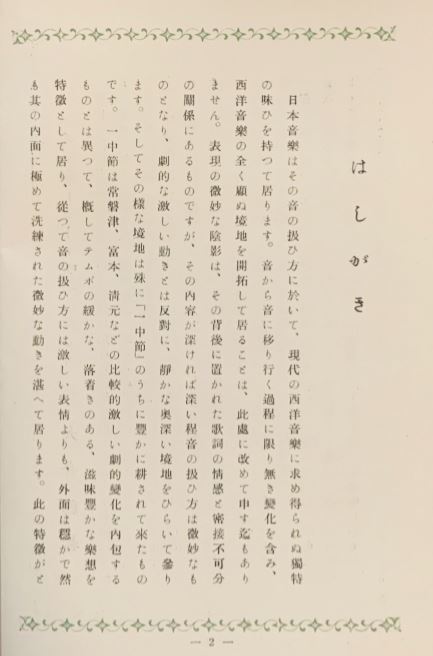

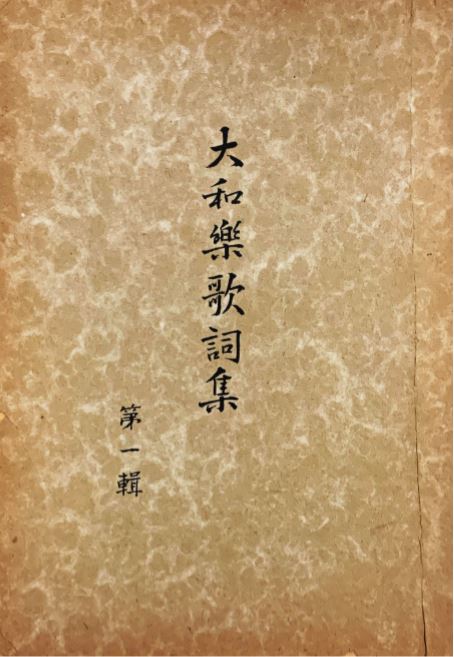
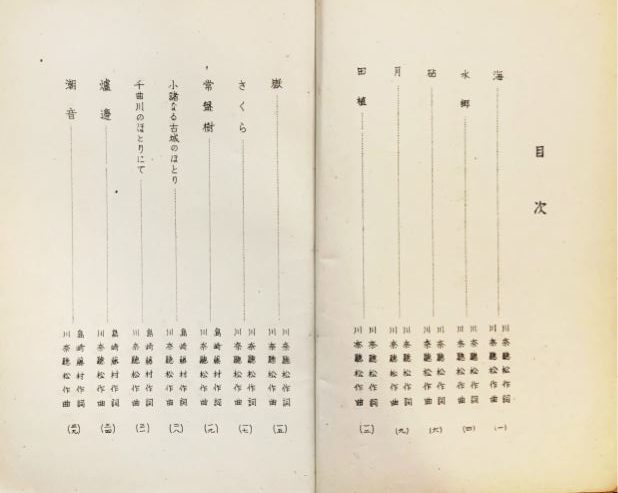

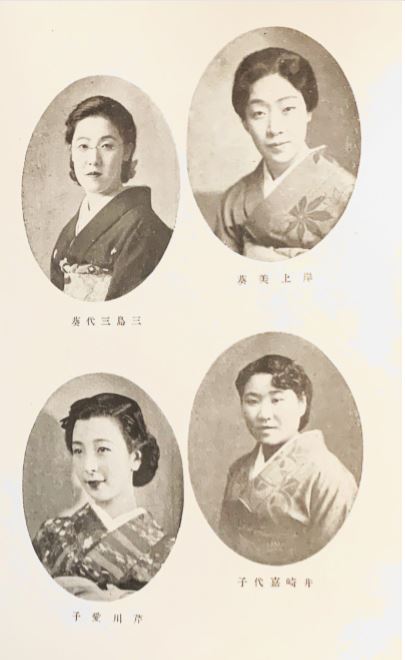
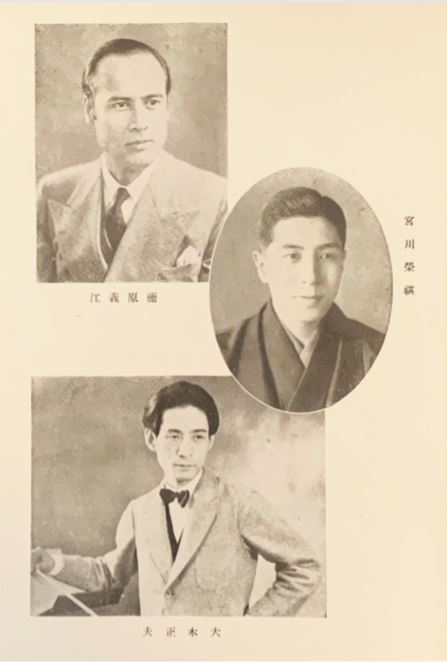
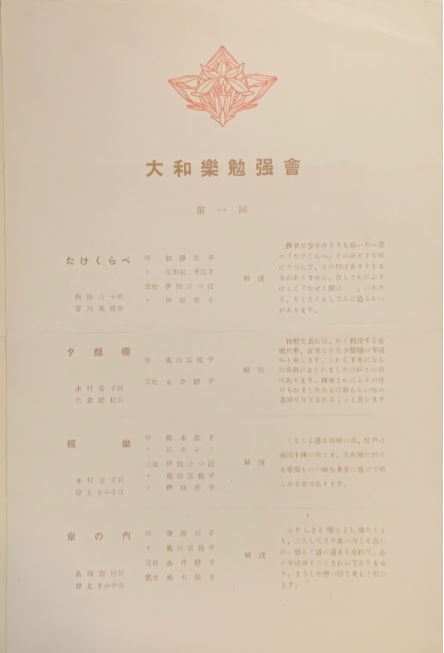
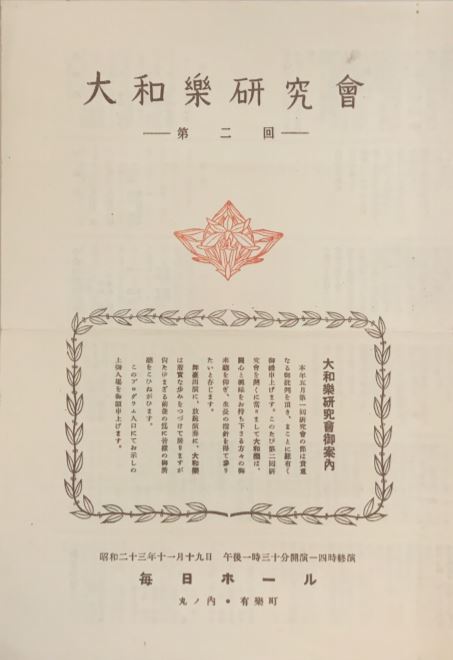
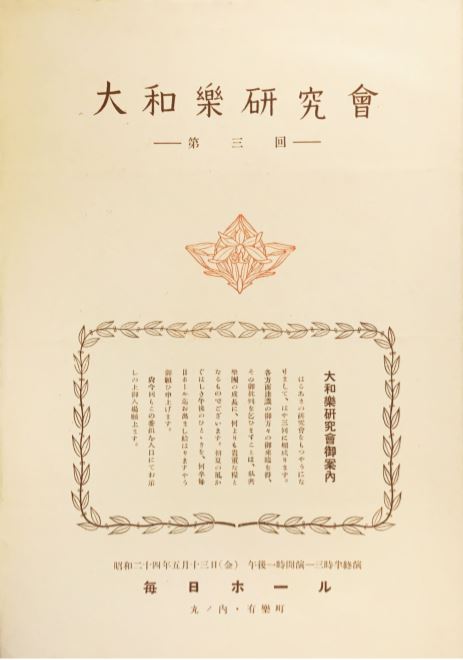
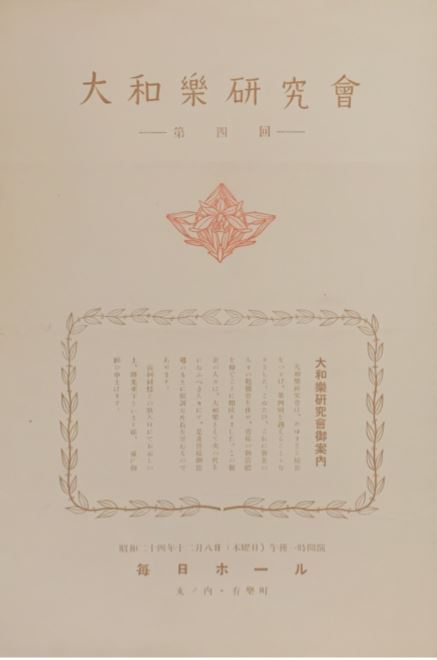
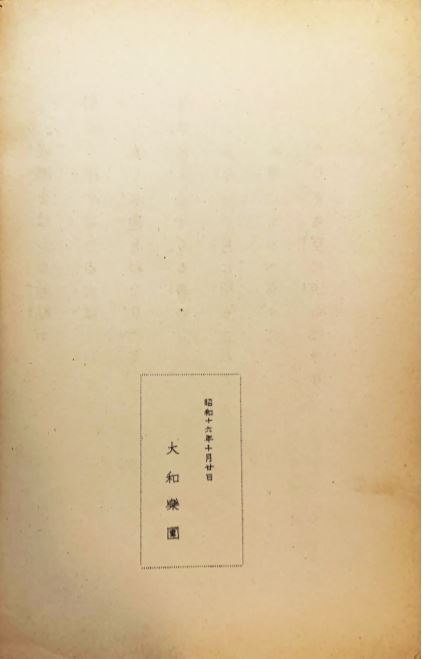
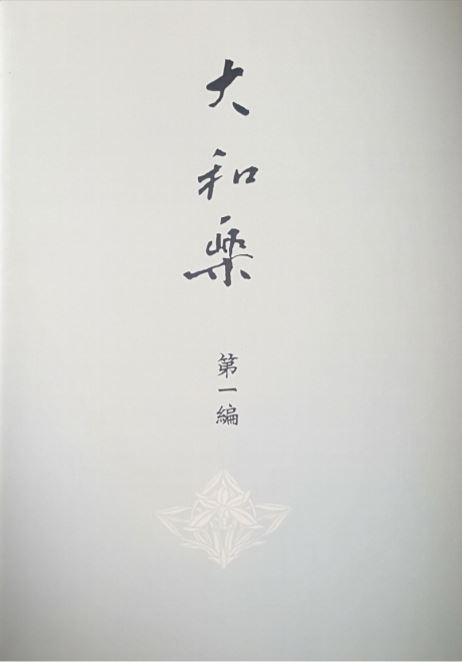
English Translation
Row One
Page 1: Yamatogaku
Page 2-4: Yamatogaku” was founded by Miyako Ichichu, the eleventh head of the Icchu-Bushi Miyako school (note1), and was founded by Yasushi Kawana (the stage name of Kishichiro Okura, later who later changed his stage name from Chosho Kawana to Chosho Yamato).
Icchu-bushi is one school of Japanese classical music. The tasteful elements of other styles such as Kato-bushi, Sonohachi, and Ogie, have been incorporated into Icchu-bushi. Lastly, this new Yamatogaku school rifts on the strengths of Western music and other forms of expression to create something suitable for modern Japan.
The emotional nuances of music is closely related and inseparable to the expressions of the lyrics. The deeper the lyrics, the more it was traditionally handled in a nuanced manner. In contrast to intense movement and drama, a deeper, more serene mood is revealed.
And such a atmosphere has been cultivated especially within the Ichichu-bushi style of music. Unlike Tokiwazu, Tomimoto, and Kiyomoto styles of music, which contain intense and dramatic changes, Ichchu-bushi is generally known for a light tempo with calm and rich melodies. From a first listen, the music feels gentle, however a deeper exploration of the music unveils the esoteric expressions and subtle movements of the pieces.
Taking advantage of this feature, Yamatogaku utilizes unique pitches that are uncommon in Western music, portamento (a technique that smoothly and gradually changes the pitch to evoke a melody rich with emotion), vibrato, etc. These special embellishments this can be enjoyed without hesitation and are based on Japanese sensibilities. The goal of “Yamatogaku” is to create music that is appropriate for modern life and to move beyond the old-fashioned sensibilities.
With this amibition in mind, Yamatogaku seeks to challenge the rules and restrictions of traditional style music and to be more inclusive. The instruments used in Yamatogaku are not limited to Japanese instruments, as Western instruments are worked in to expand the possibilities of musical expression. To bridge the Western and Japanese sound, a wind instrument called by Okuraulo was created by Baron Kishichiro Okura. In this way, instrumental compositions can offer a lyrical quality similar to vocal music.
Furthermore, as mentioned above, the unique and subtle way of segmenting intervals, as well as taking intervals smaller than semitones like one-third and one-quarter tones, is not often found in the today’s musical scores. We have no choice but to rely mainly on the excellent skill of the musicians. It is only when the performers are fully aware of this and sing or play the music consciously that a new style that meets the above-mentioned purpose comes about. From this point of view, singers must have experienced vocal skills and proficiency, and the Okuraulo is used for this purpose.
Note 1: Ichichu-bushi Miyako School
After the school was in decline, for many years the fifth generation Ichichu revived the Ichichu-bushi school and it continues to this day. There are currently three schools that remain. Icchu-bushi works are known to be dignified, simple, graceful, and elegant.
Row Three
Page 1: Book I A Collection of Yamatogaku Short Songs
Page 2: Recording the Yamatogaku music. Photo by Chosho Okura
Music has been a great source of comfort in my life after finishing my daily duties at my work. My father, Kihachiro Okura, whose stage name was Tsuruhiko, loved Icchu-bushi more than eating food as it is said in a popular senryu (humorous poem) that says, “Only their relatives enjoy listening to Icchu-bushi up to two sections.” It was know as the music that made people very sleepy, but I had to listen up to the third section of the song, which my father was able to do. Over time, I naturally became familiar with the style.
Recently, the 10th headmaster of Ichichu-bushi school passed away, and since there was no successor, I was asked to take over his position. I initially declined. However, I finally decided to follow in my father’s footsteps and take over his favorite music style as well as my father’s business. It is only because my father, Kihachiro Okura, liked Icchu-bushi music more than eating food.
Now, we’ve appropriated the masterful techniques of not only Ichichu-bushi, but other classical styles such as Kato-bushi, Sonohachi, Ogie. I’ve created something that is suitable for modern times, regardless of whether it is in the East or the West. This document illustrates how Yamatogaku music was realized.
Page 3: Photo of Baron Kishichiro Okura (Chosho Okura), 1939
Page 4 – Row 4 Page 1: Preface
Japanese music has a unique flavor in the way it handles sound that cannot be found in modern Western music. There is no need to reiterate here that the process of moving from sound to sound involves endless changes, and that he is pioneering a completely new frontier in Western music. The subtle expressions are closely and inseparably linked to the richness of the lyrics they are accompanying. The deeper the story, the more delicately the sound is handled. The melodies are sure to invite you into a quiet and profound realm. This transporation to a serene state is a special feature taken from “Ichichu-bushi.” Unlike Tokiwazu, Tomimoto, and Kiyomoto, which contain relatively intense dramatic changes, Ichchu-bushi is generally characterized by gentle tempos, calm and rich musical performance, and therefore the handling of sound is more gentle and smooth, full of sophisticated expression, rather than having a bold, literal expression. This characteristic is what makes Icchu-bushi such a popular style music, and is why it boasts of sophisticated taste.
Yamatogaku was founded by Kishichiro Okura, the 11th head of the Icchu-bushi school, and it takes the emotional expression of Japanese music contained within the tradition of Icchu-bushi, and incorporates it into modern music.
It is a new school of music that tries to create a style that appealing to everyone, with a more experimental feeling. Utilizing the extremely rich blending of sounds seen in the Icchu bushi, unique pitches, portamento, and vibrato that do not exist in Western music, he relies on spontaneity and intuition. The aim of Yamatogaku’is to create music that allows people to sing in a more heartfelt, without being confined to old-fashioned rules.
To this end, attempts have been made to incorporate techniques and forms of expression from Western music that are common today, along with non-Japanese musical instruments. The traditional restrictive Japanese style is being expanded into something more freeing and rich.
Row Four from Second Page
Page 2: Lyrics of Yamatogaku Collection Volume 1
Page 3: Program
Lyrics Music
UMI, Ocean Chosho Kawana* Chosho Kawana
SUIKYO, Riverside Chosho Kawana Chosho Kawana
KINUTA,the sound of beating cloth Chosho Kawana Chosho Kawana
TSUKI , Moon Chosho Kawana Chosho Kawana
TAUE,Rice Planting Chosho Kawana Chosho Kawana
TAKE, Ridge Chosho Kawana Chosho Kawana
SAKURA, Cherry Blossoms Chosho Kawana Chosho Kawana
TOKIWAGI (Evergreen) Toson Shimazaki Chosho Kawana
KOMORO NARU KOJO NO HOTORI
The Site on an Old Castle in Komoro Toson Shimazaki Chosho Kawana
CHIKUMA GAWA NO HOTORI NITE
On the Banks of the Chikuma River Toson Shimazaki Chosho Kawana
ROBATA (Fireside) Toson Shimazaki Chosho Kawana
* Chosho Kawana is the stage name of Baron Kishichiro Okura for Icchu-bushi
Row Five
Page 1:
(top left) Miyoki Mishima (top right)Kimi Kishigami
(bottom left) Aiko Ashikawa (bottom right) Kiyoko Izaki
Page 2:
(top) Yoshie Fujiwara (middle) Ei? Miyagawa (bottom) Masao Oki
Page 3:
大和楽勉強会 第一回 Yamatogaku Concert I 1948
大和楽研究会 第二回 Yamatogaku Concert II 1948
大和楽研究会 第三回 Yamatogaku Concert III 1949
大和楽研究会 第三回 Yamatogaku Concert III 1949
